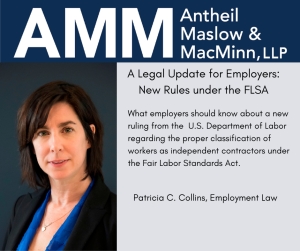The Department of Labor's New Independent Contractor Rule
Reprinted with permission from the February June 13th edition of The Legal Intelligencer. (c) 2024 ALM Media Properties. Further duplication without permission is prohibited.
On January 9, 2023, the United States Department of Labor issued a new final rule regarding the proper classification of workers as independent contractors under the Fair Labor Standards Act. While the rule is technically new, it is, in substance, a recitation of the applicable law regarding the proper classification of workers set forth by the Supreme Court.
Prior to recent rule making, caselaw guided the determination of whether a worker was an employee or independent contractor under the Fair Labor Standards Act (“FLSA”). In United States v. Silk, the United States Supreme Court outlined the factors relevant to the determination: degree of control, opportunities for profit or loss, investment in facilities, permanency of relations and skill required in the claimed independent operation. The Silk court noted that “no one factor is controlling.” Just about every court, federal or state, applies the same or similar standard to determine the issue under the FLSA or state statutes regarding minimum wage and overtime pay.
5 Common Employment Issues That Can Scuttle the Sale of Your Business
The sale or merger of a business often uncovers employment problems that may scuttle the transaction, or impact the value of the business. In my employment law practice, I’ve seen a pattern of common employment issues businesses face when they are contemplating a transaction, or that emerge during due diligence. Below are the five most common of those issues:
1. Classification of employees as “exempt” or “nonexempt” under federal and applicable state law; and time clock and hourly pay policies, and compliance with federal and state overtime rules;
2. Classification of workers as independent contractors or employees;
3. Evaluation of benefit plans to ensure compliance with plan documents and federal benefits law, and evaluation of policies related to unregulated fringe benefits, such as vacation pay or sick pay;
4. Evaluation of whistleblower and harassment and discrimination complaint procedures;
5. Evaluation of employment contracts and restrictive covenants to ensure that the restrictions included therein will protect the seller and will inure to the benefit of the buyer.
A thorough review of employment policies and procedures and contracts will eliminate trouble in the process. AMM attorneys have experience guiding employers through these issues as part of our clients’ transactions. We can help employers address the crisis when it emerges as part of due diligence. More importantly, we can help employers improve their policies and contracts to maximize value and streamline transactions.






















